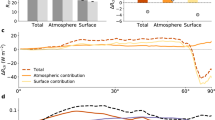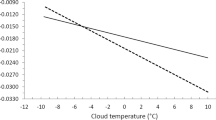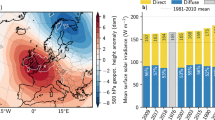Abstract
A GREAT deal of attention has been focused on the subject of Sun–weather relationships1,2. There is a clear need for physical processes and hypotheses to be brought forward and tested in this area. I propose here two theoretical schemes to account for some of the observed correlations; one is a physical argument suggested earlier3, and expanded here, that the weather may generate electrical effects in the ionosphere (which may in turn affect the magnetopause), and the other is an hypothesis that the total emissivity of the Sun (both particles and electromagnetic radiation) remains constant. I investigate the possible consequences of this hypothesis.
This is a preview of subscription content, access via your institution
Access options
Subscribe to this journal
Receive 51 print issues and online access
$199.00 per year
only $3.90 per issue
Buy this article
- Purchase on Springer Link
- Instant access to full article PDF
Prices may be subject to local taxes which are calculated during checkout
Similar content being viewed by others
References
Proc. Symp. on Possible Relationships Between Solar Activity and Meteorological Phenomena (edit. by Bandeen, W. R., and Maran, S. P.) (NASA/Goddard Space Flight Center, Greenbelt, Maryland, 1970).
King, J. W., Astronautics and Aeronautics, 10 (April 1975).
Cole, K. D., Planet. Space Sci., 22, 1075 (1974).
Beynon, W. J. G., and Winstanley, E. H., Nature, 222, 1262 (1969).
Cole, K. D., Aust. J. Phys., 13, 484 (1960).
Heppner, J. P., Proc. Symp. on Critical Problems of Magnetospheric Physics, 107 (IUCSTP Secretariat, Washington, DC, 1970).
Hundhausen, A. J., Rev. Geophys., 8, 729 (1970).
Cole, K. D., Aust. J. Phys., 15, 223 (1962).
Cole, K. D., Planet. Space Sci., 1, 000, 1971.
Roberts, W. O., and Olson, R. H., J. atmos. Sci., 30, 135 (1973).
Fairfield, D. H., J. geophys. Res., 23, 7329 (1968).
Fritz, S., in Compendium of Meteorology (edit. by Malone, T. F.), 18 (American Meteorological Society, Boston, Massachusetts, 1951).
Parker, E. N., Space Sci. Rev., 4, 666 (1965).
Wilcox, J. M., et al., J. atmos. Sci., 31, 581 (1974).
Hinteregger, H. E., Hale, L. A., and Schmidtke, G. S., Space Sci. Rev., 5, 1175 (1965).
McIntosh, P. S., et al., EOS, Trans. Am. geophys. Un., 56, 438 (1975).
Schatten, K. H., Wilcox, J. M., and Ness, N. F., Solar Phys., 6, 442 (1969).
Heath, D. F., and Wilcox, J. M., in Proc. Symp. on Possible Relationship Between Solar Activity and Meteorological Phenomena (edit. by Bandeen, W. R., and Maran, S. P.) (NASA/Goddard Space Flight Center, Greenbelt, Maryland, 1970).
Author information
Authors and Affiliations
Rights and permissions
About this article
Cite this article
COLE, K. Physical argument and hypothesis for Sun–weather relationships. Nature 260, 229–230 (1976). https://doi.org/10.1038/260229a0
Received:
Accepted:
Issue Date:
DOI: https://doi.org/10.1038/260229a0
Comments
By submitting a comment you agree to abide by our Terms and Community Guidelines. If you find something abusive or that does not comply with our terms or guidelines please flag it as inappropriate.



